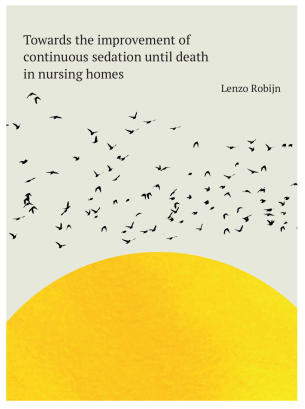Author: Lenzo Robijn
Date: 14-09-2020
Promoters: Prof. dr. Kenneth Chambaere (VUB), Prof. dr. Luc Deliens (Ghent University), Co-promoters: Dr. Judith Rietjens (Erasmus MC Rotterdam), Prof. dr. Peter Pype (Ghent University)
SUMMARY OF THE DISSERTATION
Some people approaching death experience devastating symptoms that cannot be alleviated despite intense medical and palliative treatment. This leaves health care professionals, patients and relatives with a last-resort treatment, continuous sedation until death, which entails the use of sedative drugs to induce a state of consciousness until death in order to take away a person’s experience of suffering. Though increasingly prevalent and widespread internationally, controversial issues still persist about almost every aspect of the practice, for example, it is sometimes performed suboptimally, some of the indications such as intolerable suffering and life expectancy are difficult to assess and patients and relatives are not always involved in the medical decision-making and are often ill-informed about what to expect, leading to a perceived poor quality of dying and issues with coping. Moreover, challenges with the practice are particularly pervasive in nursing homes as various specific individual and institutional factors may further complicate good practice.
Towards the improvement of continuous sedation until death in nursing homes was written as a Joint PhD dissertation and describes the practice of continuous sedation until death in Flanders, Belgium over time, with particular attention to the role of patients in the decision-making preceding. An important part of this dissertation was focused on the development of a practice protocol adapted to the specific context of nursing homes aiming to contribute to improving continuous sedation until death in Flemish nursing homes.

